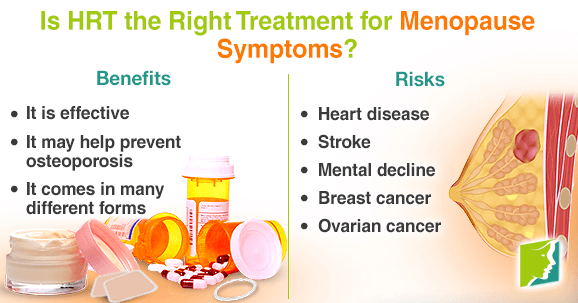There has been extensive controversy surrounding hormone replacement therapy (HRT) over the last few years, and more studies are being published about the risks of HRT for aging women's health, leading one to wonder if HRT for perimenopause and menopause symptoms is the best treatment for women. Find out below.
Benefits
A principal benefit of HRT is that it is extremely effective in managing menopause symptoms, such as hot flashes, vaginal dryness, night sweats, and more, by directly increasing reproductive hormone levels.
HRT may also help prevent osteoporosis because the increase in estrogen helps maintain bone density.
The therapy comes in many different forms - oral tablets, skin patches, vaginal creams and rings, topical gels - to suit women's preferences.
Also, women can work with their doctors to decide if they should use estrogen-only HRT or a combination of estrogen and progesterone. Women who have not had a hysterectomy usually receive a combination, while women who have undergone the surgery usually receive only estrogen.
In general, doctors recommend that patients who choose HRT take the lowest possible dose for the shortest amount of time (typically, no more than six months) because of the risks linked to HRT.
Risks
Numerous studies have been published recently highlighting the many risks of HRT, among them being:
Heart disease. HRT may increase the risk of heart disease and heart attacks in older women.
Stroke. HRT is shown to increase the risk of blood clots and may raise the risk of stroke.
Mental decline. Multiple studies have shown that HRT may elevate the risk of cognitive decline.
Breast cancer. One study found that women who take combination HRT of estrogen-progesterone within five years of menopause (perimenopause) are at a higher risk of breast cancer than those who started it five or more years after menopause (postmenopause).
- Ovarian cancer. Women who take combination or estrogen-only HRT after menopause at are an increased risk of getting ovarian cancer compared to those who don't take hormones. The risk decreases over time once the hormones are stopped.
When considering HRT, make sure to talk to a doctor and do plenty of research before making a decision. Although it can be effective, it is important to consider possible long-term risks directly linked to its use.
Keep in mind that there are other natural methods that may be just as helpful and less risky in relieving symptoms of hormonal imbalance. Learn more about these menopause symptoms treatments by clicking on the previous link.
Sources
- American Cancer Society. (2015). Menopausal Hormone Therapy and Cancer Risk. Retrieved May 22, 2019, from https://www.cancer.org/cancer/cancer-causes/medical-treatments/menopausal-hormone-replacement-therapy-and-cancer-risk.html
- Chen, W.Y. (2011). Postmenopausal Hormone Therapy and Breast Cancer Risk: Current Status and Unanswered Questions. Endocrinology and Metabolism Clinics of North America, 40(3), 509-518. doi: 10.1016/j.ecl.2011.05.006
- Mayo Clinic. (2018). Hormone therapy: Is it right for you? Retrieved May 22, 2019, from https://www.mayoclinic.org/diseases-conditions/menopause/in-depth/hormone-therapy/art-20046372
- NHS. (2016). Overview: Hormone replacement therapy (HRT). Retrieved May 22, 2019, from https://www.nhs.uk/conditions/hormone-replacement-therapy-hrt/
- The North American Menopause Society. (n.d.). The Experts Do Agree About Hormone Therapy. Retrieved May 22, 2019, from https://www.menopause.org/for-women/menopauseflashes/menopause-symptoms-and-treatments/the-experts-do-agree-about-hormone-therapy




